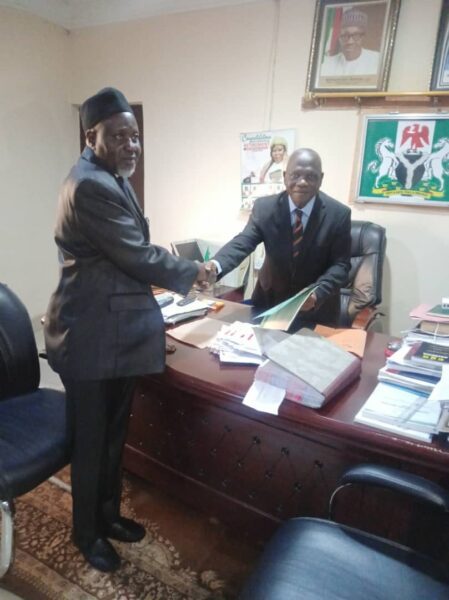Life And People
Barr. Ibrahim Attahir, A Seasoned Legal Practitioner In Gombe Is Now A Notary Public -By Ibrahim Ahmad Kala
Unlike the Commissioner for Oaths, Notary Public therefore, enjoy international reputation and recognition particularly, in the verification, authentication and certification of documents worldwide. In Nigeria, public documents are required to be certified or notarized by a Notary Public as genuine before those documents can be used abroad or in Nigeria if the document is coming from other nations.

The Chief Judge of Gombe State, Hon. Justice Joseph Ahmed Awak has today, August, 11 2022 sworn-in Barr. Ibrahim Attahir as a Notary Public. In a brief ceremony held at the CJ’s Chambers, Barr Attahir was conferred with the coverted title after being found qualified and possessed the requisite qualities.
In Nigeria, Notary Public is a senior member of the Nigerian Bar Association who has garnered at least 7 years post call experience as a legal Practitioner prior to the date of his appointment as a Notary. The appointment is usually made pursuant to the Notary Public Act, Cap. N141, 8Laws of the Federation of Nigeria, 2004.
The history and emergence of Notary Public is traced to the colonial administration when the Law No. 41 of 1936, Laws of Nigeria was enacted. Under that Law, Notaries were appointed by the Queen of England or her representative in the colony and Protectorate of Nigeria, and registered and subscribed by the Clerk of the Crown in Chancery. Following the introduction of the Notaries Public Act Law No. 107 of 1955, they are now appointed by the Chief Justice of Nigeria or the Chief Judge of a State. The activities of the Notaries were globally recognized following The Hague Apostille Convention which was officially known as The Hague Convention of 5 October 1961, Abolishing the Requirement of Legalisation for Foreign Public Documents. It was drafted by the Hague Conference on Private International Law (HCCH) and has been signed by about 100 countries including Australia and Nigeria.
In the Convention, public documents are considered to be:
1. Documents emanating from an authority or an official connected with the courts or tribunals of the State, including those emanating from a public prosecutor, a clerk of a court or a process-server (“huissier de justice”);
2. Administrative documents; and
3. Official certificates which are placed on documents signed by persons in their private capacity, such as official certificates recording the registration of a document or the fact that it was in existence on a certain date and official and notarial authentications of signatures.
In those countries for which the Convention has come in to force, one no longer need to have your document legalised by an individual country’s diplomatic or consular service. Instead, you simply need to present your notarised document to the Ministry of Foreign Affairs which will check that the signature and seal provided by your Notary Public is authentic. Once the Notary’s signature and seal are verified, the Ministry will place an Apostille on your document. An Apostille is a certificate/stamp that includes Ministry’s seal to show that the notarisation is authentic.
As you can see, The Hague Apostille Convention makes it easier for public documents to be recognised throughout the world.
According to Niki Tobi in the old case of Buhari v. INEC & Ors. (2009)2 FWLR pt. 459, p. 1462 it was held as follows:
“Although, the Notary Public Act does not specifically state the duties or functions of a notary, section 2 (2) of the Act provides that a Notary appointed by the Chief Justice of Nigeria shall perform the same duties and exercise the same functions as a Notary in England. A Notary in England performs the function of administering oaths and attest and certify by his hand and official seal, some categories or classes of documents. As a matter of practice, notaries in Nigeria perform such functions.”
Unlike the Commissioner for Oaths, Notary Public therefore, enjoy international reputation and recognition particularly, in the verification, authentication and certification of documents worldwide. In Nigeria, public documents are required to be certified or notarized by a Notary Public as genuine before those documents can be used abroad or in Nigeria if the document is coming from other nations.
Other duties of the Notary includes:
1. Administering oaths or the giving of evidence. In this instance, upon the death of President Warren G. Harding in 1923, Calvin Coolidge was sworn in as president by his father, John Calvin Coolidge, Sr., a Vermont notary public;
2. Engage in notarizing Affidavits, Declarations and Depositions;
3. Prepare Notary Certificate of Law and Good Standing;
4. Help with verification of company documents;
5. Verification of identity and or signature;
6. Witness execution of local and international documents such as Sales and Purchase Agreements, Hoint Ventures and etc; and
7. Due execution of Transfer of Landed Property, Deeed of Assignment, Mortgages, securities, company resolutions, minutes and reports among others.
Apart from being found morally and legally sound, the following are part of the requirements of being appointed a Notary in Nigeria:
1. Three copies of application letters printed on the letter headed paper and addressed to the Chief Registrar of the Supreme Court of Nigeria;
2. At least 15 copies of the Applicant’s CV;
3. Photocopies of practicing fees payment receipt for 7 years preceding the date of the application paid as and when due (before 31st March of every year);
4. Three copies of call to Bar Certificate; and
5. Three copies of Applicant’s office certificate of Incorporation.
Since every Notary appointed in Nigeria is by law deemed to be an officer of the Supreme Court of Nigeria with global repute, its glad to noted that Barr. Ibrahim Attahir is now officially, a Notary Public and indeed an officer of the Supreme Court of Nigeria.



















